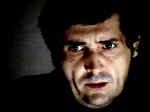Fr. Marcial Maciel, LC
March 10,1920 - January 30, 2008

"There is no denying that the cross is surrounded by glory. It is, at the same time a sign of utter defeat and indomitable hope. The defeat and the hope must be ever held together, the hope is not finally hopeful unless it has taken into account everything that contradicts hope."
- from Death on a Friday Afternoon, by Richard John Neuhaus
 Lots of people at the wake last night. Memorial T-shirts were passed out, four women collapsed on emotional overload, everyone agreed he had died much too soon... 36 years old.
Lots of people at the wake last night. Memorial T-shirts were passed out, four women collapsed on emotional overload, everyone agreed he had died much too soon... 36 years old.





